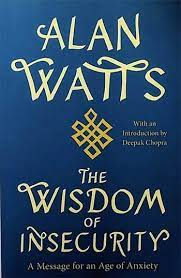Book Review: A Deep Dive into Alan Watts' "The Wisdom of Insecurity"
- TJ Joshi

- Jan 14, 2024
- 4 min read
During my free time, I usually find myself listening to Alan Watts' lectures.
I've listened to some of his lectures multiple times and yet his voice, humour, thoughts, and metaphors leave me completely amazed every time. Whether addressing the nature of existence, the pursuit of happiness, or the paradoxes of human behavior, his lectures leave a lasting impact on me. However, recently, I have developed this hunger to read. All I want to do is read. Read everything that I can get my hands on. There is an insatiable thirst to read and get completely lost in the world of books. I ordered a few books by Sigmund Freud and Alan Watts. One book that was ordered was Alan Watts' "The Wisdom of Insecurity".
Life is like a wild roller coaster, full of twists, turns, and unexpected loops. In this chaotic ride, many of us find ourselves desperately clinging to the illusion of security, hoping to make sense of the unpredictable journey. In a world that often seems fixated on the pursuit of security and certainty, Alan Watts challenges us to reconsider our fundamental approach to life in his thought-provoking book, "The Wisdom of Insecurity." Published in 1951, through this book, Alan Watts uncovers the wisdom that lies in embracing the inherent uncertainty of life. I want to share some of the interesting ideas and thoughts put forward by Alan Watts in this book.

The Illusion of Security
At the heart of "The Wisdom of Insecurity," Watts challenges the prevailing notion that security can be attained through the accumulation of possessions, the pursuit of success, or the establishment of fixed routines. He argues that the quest for certainty is, in fact, an illusion that leads to anxiety and dissatisfaction. Watts calls this the "Great Security Hunt."
It's like trying to catch a slippery fish with your bare hands.
Watts suggests that true security can only be found by embracing the inherent uncertainty of life rather than resisting it.
The Power of Now
Watts is all about living in the now. Watts advocates for a shift in consciousness towards living in the present moment. He says, "Hey, why worry about the past or the future? The present is where it's at!" It's like enjoying a delicious ice cream cone. You could stress about how fast it's melting or how many scoops you'll have left, or you could just savor the sweetness in the moment." Watts encourages us to let go of past regrets and future worries and start enjoying the ride right now.
By embracing the present, he suggests, individuals can find a sense of freedom and liberation from the constraints of a constant search for security. Application: Instead of constantly seeking solutions to life's challenges, try embracing each experience as it comes. See the reality as an adventure rather than a puzzle to solve.
The Paradox of Control
Have you ever tried to control everything in your life? Watts says it's like trying to squeeze water – impossible and frustrating.
One of the central paradoxes explored in the book is the idea that the more we try to control and secure our lives, the more we become enslaved by our efforts.
He introduces the paradox of control: the more you grip tightly, the more you lose. It's like trying to control a kite in the wind. Instead of yanking on the string, Watts suggests we go with the flow. Imagine dancing in the rain instead of hiding from the storm – that's the vibe he's going for.
Watts asks us to reflect on the nature of control, proposing that true freedom arises from surrendering the illusion of control rather than attempting to grasp it.
Application: Instead of relentlessly pursuing happiness, consider that the pursuit itself may be the source of your dissatisfaction. Allow contentment to arise naturally, much like a flower blooming without force.
Embracing Change and Impermanence
Watts contends that the only constant in life is change, and attempting to resist this natural force leads to suffering. By letting go of the desire for unchanging security, individuals can find a profound sense of peace and contentment in the midst of life's fluctuations. Life, Watts says, is like a river constantly flowing and changing. To resist this flow is like swimming against the current – exhausting and counterproductive. Picture yourself on a raft, navigating the twists and turns of the river. The more you try to control its direction, the more resistance you face. Watts encourages us to let go of the oars, surrender to the current, and enjoy the ride.
Application: Embrace change as a dance rather than a battle. Move with the rhythm of life's transformations, and you'll find yourself in a more harmonious state. If you find yourself doing things out of obligation or fear, consider the impact on your well-being. True fulfillment comes from engaging in activities that resonate with your present self.
The Role of Eastern Philosophy
Watts was a fan of Eastern philosophies like Taoism and Zen Buddhism. He sprinkles their ideas into his wisdom stew to add some extra flavor. It's like combining your favorite snacks to create a unique, tasty treat. By blending Eastern and Western thoughts, Watts creates a philosophy that speaks to everyone, no matter where you're from. Here's my favorite quote from the book : "The meaning of life is just to be alive. It is so plain and so obvious and so simple. And yet, everybody rushes around in a great panic as if it were necessary to achieve something beyond themselves."
Conclusion
In the grand finale, Watts leaves us with a powerful message: true wisdom lies in embracing the insecurity of life's roller coaster. Instead of desperately seeking security, he suggests we find joy in the uncertainty, dance with the chaos, and savour every moment of the ride.
Alan Watts, with his simple language and relatable metaphors, offers us a guide to not just survive but enjoy the ride. So, let's loosen our grip on the safety bar, throw our hands in the air, and embrace the wisdom of insecurity – because, in the end, it's not about reaching a destination; it's about enjoying the journey.




Comments